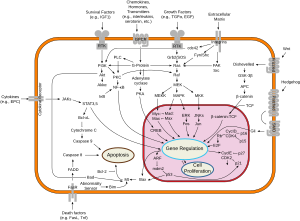Bcl-xL

B-cell lymphoma-extra large (Bcl-xl, or BCL2-like 1 isoform 1) is a transmembrane molecule in the mitochondria. It is a member of the Bcl-2 family of proteins, and acts as a pro-survival protein by preventing the release of mitochondrial contents such as cytochrome c, which would lead to caspase activation. It is a well-established concept in the field of apoptosis that relative amounts of pro- and anti-survival Bcl-2 family of proteins define whether the cell will undergo cell death: if more Bcl-xL is present, then pores are non-permeable to pro-apoptotic molecules and the cell survives. However, if Bax and Bak become activated, and Bcl-xL is sequestered away by gatekeeper BH3-only factors (e.g. Bim), causing a pore to form, cytochrome c is released leading to initiation of caspase cascade leading to apoptotic events.

Bcl-xL functions at the level of intrinsic apoptotic pathway, while extrinsic pathway (Fas/TNF death receptors) directly leads to caspase activation. There is a link between extrinsic and intrinsic pathways, via caspase-mediated cleavage of BID, which functions to activate pore formation at the mitochondria.
Effects
Bcl-xL knock-out animals die in utero due to neuronal apoptosis and anemia (erythroid apoptosis).
Similar to Bcl-2, Bcl-xL has been implicated in the survival of cancer cells. Bcl-xL is known to be over-expressed in hematopoietic disorders such as polycythemia vera, where Jak2 mutations lead to over-activation of intracellular signaling molecules, such as Stat5, which lead to transcription of Bcl-xL gene.
In erythroid lineage, Bcl-xL is a major survival factor responsible for an estimated half of the total survival "signal" proerythroblasts must receive in order to survive and become red cells. Bcl-xL promoter contains GATA-1 and Stat5 sites. This protein accumulates throughout the differentiation, ensuring the survival of erythroid progenitors. Because iron metabolism and incorporation into hemoglobin occur at/inside the mitochondria, Bcl-xL was suggested to play additional roles in regulating this process in erythroid cells.
Related proteins
Other Bcl-2 proteins include Bcl-2, Bcl-w, Bcl-xs, and Mcl-1.
